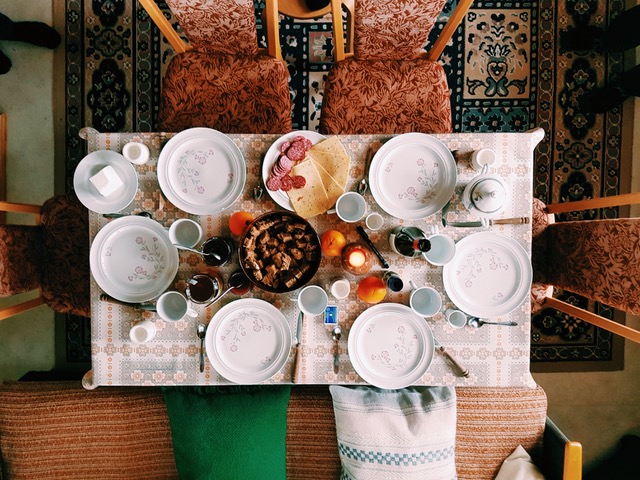
By Nicole O’Meara | Instagram: @nicoleeomeara
My first experience with refugees was when I was very young, although I didn’t learn the word, “refugee,” until many years later. I was taught to call them, “Guests.”
For a short time, my father worked for an inner-city mission in the Bay Area of California. As a mechanic, he was responsible to keep the mission’s vans and buses running. When they were short-staffed, my father drove the bus to pick up Guests and bring them to the mission. On occasion, I was allowed to accompany him on these trips.
I sat on the front seat and watched as the bus filled with people very different than me. Dad told me they were from Vietnam and Cambodia, places I didn’t know how to find on a map. Brown-skinned parents carried tired children, some without shoes. They whispered words that clipped and twanged in my ears. Their clothes, in various shades of brown, hung loose on every one of them. The oldest, wrinkled and hunched over, were given the best seats, a clear sign of reverence even a child could not miss. As they piled in, I wondered why they were there and why they looked so sad.
Once, I followed the crowd off the bus and into a small chapel. The room was familiar enough, with lines of wooden pews and a large oak table near the front. There, the Guests sang hymns using strange words, not the words I sang to the same tune on Sundays. I watched more than listened as a man at the front stood to speak. It didn’t need to be in English for me to recognize the sounds of a fiery gospel message. The children fell asleep while their mothers rubbed their heads and the preacher droned on. My sister and I would have run off to play in the back of the room after such a long sermon but these children stayed with their parents quietly. My first experience with refugees, guests to our country, was simply a look at tired, weary people.
My second experience with refugees came three decades later. Our church partnered with a local ministry to share Thanksgiving dinner with Arab refugees. With our favorite Thanksgiving side dish in tow, my husband and I packed our three children into the van and drove to Sacramento.
Our two youngest children, adopted from Ethiopia, were still learning English at the time and didn’t understand Thanksgiving or why we were eating turkey dinner with strangers who also didn’t understand English. In a way, they had more in common with our Arab guests than we did, being equally new to every holiday and social gathering. As a mother to little newbie Americans, my heart opened to the discomfort our Arab Guests were experiencing.
We entered a crowded hall packed wall-to-wall with people. Families entered, timid and wide-eyed. Some recognized a ministry worker from the local coffee shop that also served as a translation center. Others clearly knew no-one. They wore an array of Middle Eastern clothing mixed with Goodwill hand-me-downs: ill-fitting jeans and half-worn sneakers.
We found our assigned table and set out our holiday dish. A translator introduced us to the Guests we would dine with, a man and his wife and three children. Just like us, a family of five. Our hosts for the evening gave a mini-lesson on pilgrims and the first Thanksgiving dinner but I doubt many in the room understood.
The Guests who sat at our table had come to Sacramento from Syria less than one month earlier. The mother brought a plate of hummus to share and sat silently in a beautiful black headscarf. The father was more eager to talk. Our translator kindly relayed their story as the father told it.
They were from Syria but left suddenly after he was shot in the leg, he explained as he pointed to his thigh still wrapped in a compression bandage. ISIS soldiers came to the hotel where he worked and shot him, accusing him of being friendly with Americans. They did not want to leave Syria like so many of their friends had but after the shooting, they had no choice. Having lived away from home three times in my life, I understood the desire to be home. It was clear to me that while they were guests in our country, they would dearly love to be back home.
Sometime later, I realized my children and their children had left the table to play in the corner. I looked at the mother with the universal expression that says, “I’m ok with this if you are.” She smiled back, displaying the first sign of comfort all evening. In that moment, I realized the relief my children brought this tired mother and I was grateful we had come. I gave my kids a thumbs-up signal and off they went. Our Ethiopian children and their Arabic children found a way to cross the language-barrier: a game of tag. It seemed to be universally true that mothers from all countries get worn out by antsy children and children can lead the way to crossing cultural boundaries.
Sharing a holiday meal with refugees opened my eyes to many things, perhaps the most practical is this: food facilitates connection. In the end, we gobbled up their delicious hummus and our hungry, weary guests left with full tummies. My children brought joy to their family just by being kids. And as we sat together, my husband and I listening to their story gave dignity to their journey. It cost my family so little to connect with these Guests, to make them feel comfortable in a season when every day is filled with small discomforts. Hospitality, I learned, is a simple way to welcome the stranger, to welcome the Guest.
About Nicole:

Nicole O’Meara writes about community, adoption, and hope. As a survivor of undiagnosed disease and a mother by adoption of children with trauma backgrounds, hope is the anthem in her home. Nicole lives with her family and sweet aussiedoodle in the Sierra foothills of northern California. Find her at her website, or on Facebook or Instagram.
